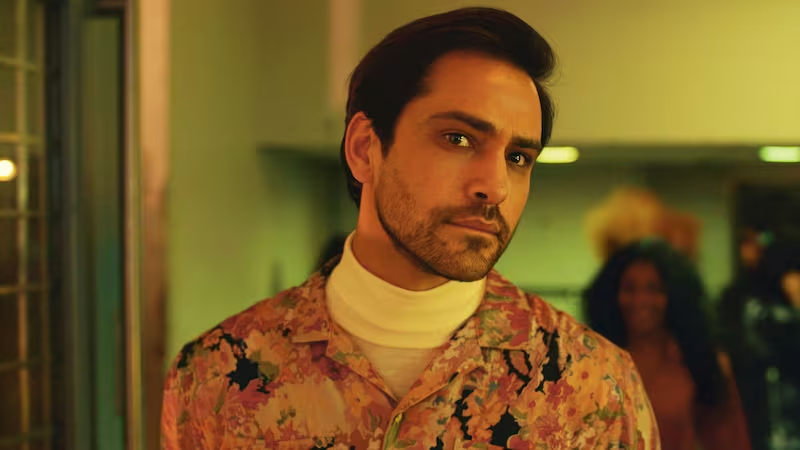Shot in one continuous take, Alexander Sokurov’s 2002 period-piece fantasia Russian Ark was such a formal achievement that it inspired two decades’ worth of like-minded edit-free features. Medusa Deluxe is the latest to attempt that feat, or at least pretend to—as with many of its predecessors, there are a few instances where writer/director Thomas Hardiman has apparently used some stitching to give his material the appearance of seamlessness. Those potential cheats, however, are inconsequential when compared to this A24 import’s more serious shortcomings, all of which ultimately stem from its central gimmick.
Medusa Deluxe (in theaters Aug. 11) is set at a regional English hairdressing competition run by Rene (Darrell D’Silva) that has been wracked by a tragedy: the murder of Mosca (John Alan Roberts), a beloved competitor who was found scalped in a dressing room. In light of the tight-knit nature of this community, as well as the method used to end his life, Mosca’s demise has shaken everyone preparing to show off their fantastical ’dos on stage.
As befitting a whodunit, there are suspects galore, and Hardiman begins by introducing us to perhaps the most overtly suspicious of the bunch: Cleve (Clare Perkins), whose anger practically seeps out of her pores while she finishes up a crazy hairstyle on a model (it involves a glowing 18th-century Chinese ship) and curses at and threatens Divine (Kayla Meikle), a friend who’s recently re-embraced her Christian faith.
Mosca had a restraining order against Cleve due to a prior physical altercation, which further indicates that she might be the killer. Since this is all dispensed in the first five minutes, though, there’s good reason to believe that Hardiman hasn’t tipped his hand this early, and that’s confirmed by the ensuing tours through the facility’s backstage areas, where various hairdressers are sitting around gossiping about this fateful turn of events.
Vaping in a locker room, Rene is grief-stricken over Mosca’s death, since he was carrying on a covert relationship with him behind the back of Mosca’s partner Angel (Luke Pasqualino), with whom Mosca was raising a son named Pablo. Models Inez (Kae Alexander) and Etsy (Debris Stevenson) are wary of security guard Gac (Heider Ali), who shows up asking for baby wipes to clean off a bloody locker, and whose general demeanor screams “scary.” And Kendra (Harriet Webb) is also the target of various people’s ire, given that she’s less than broken up about this situation and rumors abound that she’s been bribing Rene in order to come in first.
These individuals may sound like modern-day variations of Agatha Christie players but Medusa Deluxe doesn’t flesh them out in even a single dimension. Together, they’re so paper-thin as to be borderline invisible, and that indistinctness extends to Mosca himself—a figure about whom we hear plenty but see little (until the cursory finale) and, thus, feel nothing.
Mosca is the black hole at the center of this mystery, and he's surrounded by people who have been sketched in hasty fashion. Worse, they’re lacking the very flamboyance that one might expect from a scenario such as this. While their appearances are all superficially over-the-top, their personalities and behavior are rather mundane, as are their issues with one another. Considering that Hardiman often focuses on just one or two characters at a time—thereby leaving the rest off-screen for long stretches—it’s puzzling that they’ve been painted with such thin brushstrokes.
Medusa Deluxe’s problems can by and large be traced back to its signature stunt. Hardiman executes his single take with technical proficiency; the only obvious interruption comes via a midway-point calamity, and even that resonates as rather minor. Yet from the get-go, there’s no meaningful connection between this approach and the story at hand, and his roving camera movements bear scant relationship to the drama.

Consequently, it comes across as a shallow look-at-me ploy that’s been executed because it’s a means of gussying up what would otherwise be a rather tepid thriller. Strangely, though, Hardiman paces his action incredibly slowly; thanks to numerous sequences in which men or women walk alone through hallways, up staircases, and across parking lots (all of which are designed to give the other actors time to get into position for their next appearances), the film moves at a lethargic pace, marked by lots of transition filler.
When not trailing behind (or in front of) ambulatory loners, Medusa Deluxe is staging one scene after another that’s drowning in exposition—a deadening circumstance for a film that wants to be all about technical showmanship. Framing everything in a boxy 4:3 aspect ratio, Hardiman conjures a few nice images (such as some early silhouettes of Rene) but his metronomic pacing (amplified by a score of clickety-clackety percussion) is torpid.
With no twists or clues to keep things lively and volatile, one’s mind instinctively begins to ponder how things are being precisely timed, where the other actors are moving to in the background, and the many other behind-the-scenes logistical challenges inherent to such an endeavor. The longer it goes on, the more one senses crew members standing just off-screen with stopwatches, making sure that everyone is staying on schedule.

Medusa Deluxe’s camera oh-so-slowly encircles and follows ciphers around a series of bland dressing rooms and duller corridors, its revelations so tame as to be utterly trivial. So misguided is its storytelling that Cleve, the one participant who has a moderately active pulse, is basically forgotten after the opening passage, cast aside so we can listen to others divulge secrets about Mosca—namely, that he was illegally smuggling and selling hair-loss pills in order to support himself, Angel, and Pablo—that might have been funny if the film had anything resembling a sense of humor.
From the way its characters interact, to its shift between various focal points, to its introduction of new suspects, everything is overly choreographed, resulting in inertia.
Weirdest of all, Medusa Deluxe barely bothers to highlight the very enormous, eccentric hairstyles that should be at the forefront of this affair. It takes a lot of effort to make a milieu this colorful feel so mild.
Liked this review? Sign up to get our weekly See Skip newsletter every Tuesday and find out what new shows and movies are worth watching, and which aren’t.






